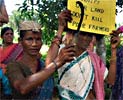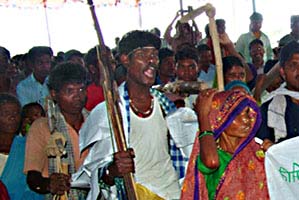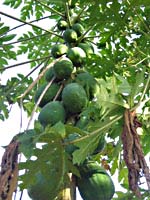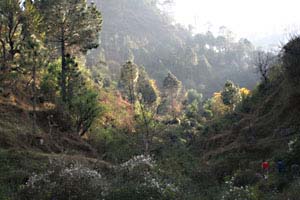Victory Over Mining Giant
new hope for villagers resisting displacement
Niyamgiri, Odisha (Orissa)
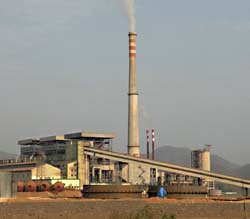 The bauxite refinery causes a lot of air pollution. There is a huge amount of very toxic waste, which pollutes the water and soil.
The bauxite refinery causes a lot of air pollution. There is a huge amount of very toxic waste, which pollutes the water and soil.
'Victory for David over Goliath' wrote the English national newspaper The Telegraph August 2010, when the Indian government decided to
reject a proposal from the mining giant Vedanta to mine bauxite (raw material for aluminum ore) in the East Indian state of Odisha. Later
on the Indian Government also canceled a permit for Vedanta's aluminum refinery in the same area. These historical decisions are the result
of year long well determined non-violent struggle of the villagers in this area, especially people of the Kondh tribe.
More photos
The Kondh Adivasis (tribal or original people) wrote history. Niyamgiri, the area where it is all about, is mentioned nowadays together with
'Nandigram' and 'Singur'. The former village prevented the construction of a Special Economic Zone (an SEZ, a factory terrain); the later forced
the powerful Indian multinational Tata to deconstruct a just build car factory.
From now on wherever there is a village meeting about displacement for mining, a dam or another big project activists will mention the successful
struggle of the Kondh in Niyamgiri. Then there will be applause. Because the Kondh proved forest people have the law at their side. Indian law
forbids encroaching forests where indigenous peoples live. Other laws give strict rules about protection of the environment. Until now nobody
cared about these laws. But the Kondh Adivasis forced the Indian government to maintain these laws. The Central Indian government had to stop the
mighty English-Indian multinational Vedanta.
History
 Skin diseases by the polluted water.
Skin diseases by the polluted water.
At 2004 Vedanta started a bauxite refinery at Lanjigarh, in the east of Odisha. The factory makes aluminum ore out of bauxite. This production
takes a lot of water and electricity and gives a huge amount of very toxic waste.
Vedanta didn't provide the Adivasis the promised jobs. Air pollution caused tuberculosis and water pollution severe skin
diseases, unknown is this area before. Rivers dried up and so agriculture declined.
Big international ngos like Action Aid from the UK (development), Survival International (indigenous peoples) and Amnesty (human rights)
started campaigning in the West. Because Vedanta is listed at the London Stock Exchange, the annual general meeting is in London. Since 2006
every year a mixed group of angry citizens protests in front of the meeting. Several activist shareholders ask critical questions every year.
The Church of England decided to sell its Vedanta shares because the company has no "level of respect for human rights and local communities". A Norwegian
and Dutch pension fund withdraw their money for the same reason.
The financial world became irritated because Vedanta waves aside all the objections. Even from the OECD, the organisation of the most powerful
economies of the world. The right wing financial newspaper The Wall Street Journal wrote: "The OECD last year issued a public denouncement of Vedanta
for failing to put in place an adequate and timely consultation mechanism to engage the Dongria Kondh (..) Vedanta CEO MS Mehta said the company has
already held extensive consultations with the local community. Some investors remain to be convinced."
Indian minister: 'Blatant disregard for the rights of the tribal groups'
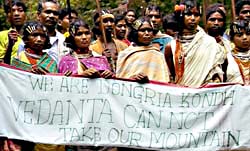 One of the many protests of the Dongri Kondh tribe.
One of the many protests of the Dongri Kondh tribe.
Mid August 2010 after a very critical report of the official 'Forest Advisory Committee' the Indian government decided not to give
clearance for a bauxite mine. "There has been a very serious violation of the Environment Protection Act, the Forest Conservation Act and
the Forest Rights Act," said Union Minister for Environment and Forests Jairam Ramesh. According to him Vedanta has shown a "shocking" and
"blatant disregard for the rights of the tribal groups". India's Home Minister P. Chidambaram, really not the most progressive politician from
India, told journalists: "We will not allow these extractive industries if it means destroying the environment and the natural habitat of the tribal people".
Rahul Gandhi son of Congress general secretary, big new star of this party and son of Congress leader Sonia Gandhi went to Niyamgiri
two days after the decision of the government. He congratulated the villagers and said: "My job as your sepoy in New Delhi has just started. Whenever
you require my support, call me. I will be there with you." Sonia Gandhi told that "the fundamental rights [of the tribal people] will not be sacrificed
in pursuit of developing natural resources".
Several political observers point to the growing influence of the Maoist guerrilla in tribal area, where most mining projects take place. But in
this district the guerillas didn't have much influence and the struggle has been non-violent, be it very stubborn. In spite of many humiliations of
bureaucrats and politicians and violence of the police. Perhaps the non-violence did forecomelarge scale violent police and para-militaryoperations
as we see it nowadays in the neighbour state of Chhattisgarh.
Most remarkably Union Minister Ramesh brought down the production of aluminum ore of the bauxite refinery at Lanjigarh with 80 per cent. Because
eleven out of fourteen bauxite mines which provide the raw material for these refinery didn't have an environmental clearance. Also because Vedanta
expanded the factory already six times without permission. Vedanta did go too far. Even for a mighty multinational there are some borders to respect.
Go to next page: photo series factory, pollution and protest
Go to overview articles and photo series Odisha
